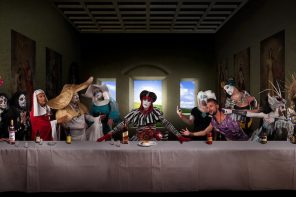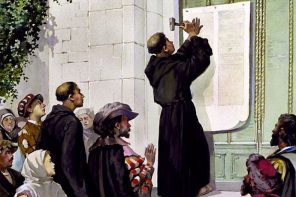If Nicholas Hansen cheats on Alissa Swanciger, he’ll owe her 1,000 silver dollars. The penalty is set forth in their marriage contract, the one they presented two years ago to a county clerk in Grand Junction, Colorado. It’s the only document they signed that day.
Christopher Hansen, Nicholas Hansen’s father, presided over the ceremony. He’s not a minister, and he’s not certified to perform weddings. That didn’t matter, Nicholas Hansen said, “According to our contract, we were married.”
Heartfelt vows, a private contract and a few witnesses are all that’s required to be married in God’s eyes, he said. The couple asked the county clerk to file a copy of their contract to make public the fact that they were now bound by marriage. In Colorado, where requirements for common law marriage are unusually lax, that was enough.
But the couple never applied for a formal marriage license, Christopher Hansen said. They didn’t ask permission from the government to get married. Instead, they were married then asked the government to help them publicize the fact. That’s how it used to be done, he said, before the government co-opted marriage, a sacred union created by God.
Nicholas Hansen and his wife didn’t want their union to be sullied by governmental approval—the same approval that may soon also include same-sex unions.
As state laws waver on gay marriage, a growing cadre of conservative Christians say their status as husband and wife has been marred by a deteriorating definition of marriage. If the state is willing to stray from what they believe is the biblical version of marriage, they’d rather reject the state’s attempt to legalize their own unions, even if it’s illegal in most states to perform marriage ceremonies without licenses.
A marriage between a man and a woman is blessed by God, said John Cobin, a South Carolina-based financial planner. A union between a same-sex couple isn’t marriage at all, even if legislators say it is.
Cobin, a Southern Baptist, said a growing number of people have contacted him for advice on how to marry without a state license. He has published dozens of articles on church-state issues on his Web site, but his opinions on marriage are gaining popularity. “There are a lot of people who are no longer interested in state marriages,” Cobin said. “For religious reasons, they balk at it and say ‘No.’”
Covenant marriages, of the type Mike Huckabee, then governor of Arkansas, entered into with his wife in 2005, aren’t enough for some conservative Christians. Huckabee’s widely publicized second wedding was more of an upgrade to the original vows he and his wife promised one another when they married three decades ago, with a promise to seek counseling when problems arise and to only divorce if adultery, abuse or other extreme offenses are committed. Huckabee’s covenant marriage, while only legal in a few states, still relies on the government’s approval.
Before God, Not a County Clerk
Christians are aching for a return to their roots, Cobin said. They want to get married in the same way Martin Luther, Charles Spurgeon, and other historic church leaders did—before God, not before a county clerk.
If the government endorses gay marriage, religious conservatives will be more inclined to isolate themselves, said Maggie Gallagher, president of the Institute for Marriage and Public Policy, which opposes gay marriage. That could cripple the movement to preserve marriage for heterosexuals, she said.
“The strongest supporters of marriage will be pushed out of the public square, at a minimum, in a way that will weaken the civil institution,” she said.
But Cobin’s solution to the marriage debate is gaining steam, from both sides.
Barry Lynn, a minister ordained by the United Church of Christ, bristles whenever he applies for recertification to perform wedding ceremonies. “It offends me,” he said. “It’s not the state’s business to make me an officer in my ministerial capacity.” Lynn is also director of Americans United for the Separation of Church and State, an organization that has fought to remove monuments of the Ten Commandments from public places, protect military enlistees from evangelistic campaigns, and end earmarks that place federal money in the hands of faith-based organizations. Americans United also advocates government support of same-sex unions.
Lynn said he’s tempted to perform wedding ceremonies without state licenses, but he knows that could cause problems for the couple later on. Name changes would be a headache, they wouldn’t get tax benefits, and any future child custody or property disputes could get ugly.
Cobin disagrees. “When was the last time anyone asked you to see your marriage license?” he said.
Still, Lynn is skeptical that pulling out of the legal marriage system is the answer. Instead, he said, the federal government should separate the religious and civil components of marriage. The state would recognize all unions, and churches could have the freedom to allow or bar certain types of marriage ceremonies.
That’s a solution Douglas Laycock, a professor at the University of Michigan, has been advocating for years. For generations in the United States, the government required little more than a public notice of marriage in order to recognize a union between two people. By the 1920s, certain states required that couples apply for marriage licenses as part of an effort to prevent biracial unions. Modern marriage blends civil and religious obligations.
“As long as we had a relative consensus about what marriage meant, it didn’t cause significant problems,” Laycock said. “We don’t have that consensus anymore.”
A federally-imposed split of civil and religious marriage could be within reach if more people, like Cobin, backed away from the state’s policies, he said. Couples could choose to be married in a church for religious acknowledgement of their union, in a civil hall for legal acknowledgement of their union, or both. That’s how it works in most of the developed world, he said.
The problem in the United States is that most activists in the debate are pressing for a federal definition of marriage. They won’t settle for a separation of church and state, Laycock said. “It still sounds so strange to most folks that no politician wants to touch it,” he said.
Gallagher, the anti-gay marriage activist, called the idea “silly.”
“All the options, assuming failure to defend marriage in the public square, are deeply second-best alternatives,” she said.
To Christopher Hansen, the state’s involvement in marriage at any level isn’t ideal. “Marriage is about me, my wife and God, not me, my wife and the government,” he said. “I don’t like that ménage a trois.”




